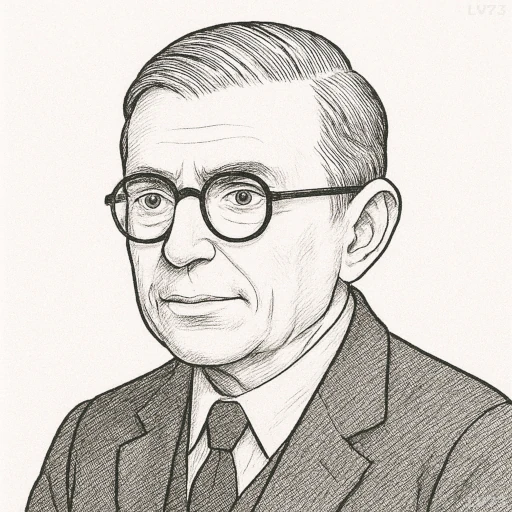“God is absence. God is the solitude of man.”

- June 21, 1905 – April 15, 1980
- Born in France
- Philosopher, novelist, playwright
table of contents
Quote
“God is absence. God is the solitude of man.”
Explanation
In this quote, Sartre delves into the existential idea that the absence of God reflects the solitude of the human condition. By stating “God is absence,” Sartre is emphasizing the idea that there is no inherent divine presence or higher power to provide meaning or purpose to human existence. This absence of God is not merely the lack of belief in a deity, but a profound existential void—a recognition that there is no external force governing or giving meaning to life. This aligns with Sartre’s atheistic existentialism, which holds that humans are alone in the universe and must create their own meaning, rather than relying on a divine or predestined purpose.
The second part of the quote, “God is the solitude of man,” suggests that this absence of God is inextricably linked to the loneliness or solitude that humans experience in a universe devoid of inherent meaning. The solitude of man, in this sense, is not just a physical or emotional isolation, but an existential condition—an awareness that, without God or a higher power, human beings must confront their freedom and responsibility alone. There is no divine blueprint or cosmic guide, and this freedom can feel overwhelming or even absurd. The solitude is the recognition that we must face the burden of defining ourselves and creating meaning in a world that offers no clear direction or purpose.
In modern contexts, this quote resonates with the search for meaning in a world where traditional religious beliefs or systems of understanding are often questioned or abandoned. Many people today experience a sense of existential loneliness, struggling with the absence of clear meaning or purpose. Sartre’s words invite us to reflect on how we deal with the freedom that comes with this absence of divine guidance, and how we navigate our solitude in creating our own sense of purpose in a world that does not provide it for us. It challenges us to confront the freedom and responsibility that come with being alone in a universe where we must create our own significance.
Would you like to share your impressions or related stories about this quote in the comments section?


